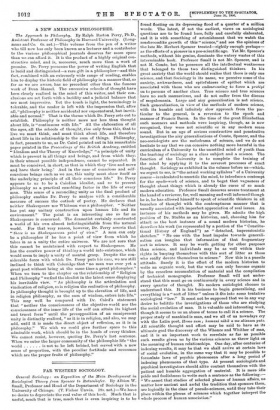A NEW AMERICAN PHILOSOPHER.
The Approach to Philosophy. By Ralph Barton Perry, Ph.D., Assistant Professor of Philosophy in Harvard University. (Long-
mans and Co. Cs. net.)—This volume from the pen of a writer who till now has only been known as a lecturer and a contributor to the various philosophical journals deserves far more space than we can afford it. It is the product of a highly original con- structive mind, and is, moreover, much more than a work of promise. Dr. Perry possesses the power of writing English that is lucid and distinguished—a rare gift in a philosopher—and this
fact, combined with an extremely wide range of reading, enables him to display the historic field of philosophy in a manner that, so
far as we are aware, has no precedent other than the famous work of Dean Mansel. The successive schools of thought have been clearly realised in the mind of this writer, and their con- clusions are set forth with a lucidity and a judicial balance that
are most impressive. Yet the touch is light, the terminology is tolerable, and the reader is left with the impression that, after all, "philosophy is neither accidental nor supernatural, but inevit- able and normal." That is the theme which Dr. Perry sets out to establish. Philosophy is neither more nor less than thought about life, is "continuous with life." All the elaboration of all the ages, all the schools of thought, rise only from this, that to live we must think, and must think about life, and therefore about life in its relationship to the sum of things. Philosophy, in fact, presents to us, as Dr. Caird pointed out in his remarkable paper printed in the Proceedings of the British Academy, entitled "" Idealism and the Theory of Knowledge," "a principle of unity which is present in all things and beings, and from which they in their utmost possible independence, cannot be separated. It must be conceived, in short, as that in which they 'live and move slut have their being.' And in the case of conscious and self- conscious beings such as we are, this unity must show itself as the underlying principle of all their conscious life." Dr. Perry appears to us to be a Cairdian idealist, and so to present philosophy as a practical ennobling factor in the life of every man. This sense of a reconciling unity as the final product of philosophy enables Dr. Perry to analyse with a considerable measure of success the outlook of poetry. He declares that neither Shakespeare nor Whitman was a philosopher. " Neither has put any unitary construction upon human life and its environment." The point is an interesting one so far as Shakespeare is concerned. The dramatist certainly constructed a world of his own almost indistinguishable from the natural world. For that very reason, however, Dr. Perry asserts that " there is no Shakespearean point of triew." A man can only be a philosopher if he has a point of view from which he takes in as a unity the entire universe. We are not sure that this cannot be maintained with respect to Shakespeare. He has the creative power of thinking a world into existence, which would seem to imply a unity of mental grasp. Despite the con- siderable force with which Dr. Perry puts his case, we are still inclined to think with Coleridge that "no man was ever yet a great poet without being at the same time a great philosopher." When we turn to the chapter on the relationship of "Religion and Philosophy " we find the idealist in the latest sense displaying his inevitable view. " As philosophy is the articulation and vindication of religion, so is religion the realisation of philosophy. In philosophy thought is brought up to the elevation of life, and in religion philosophy, as the sum of wisdom, enters into life." This may well be compared with Dr. Caird's statement that "neither the consciousness of the objective world nor the consciousness of the inner life of the self can attain its highest and truest form " until the presupposition of an omnipresent unity is distinctly realised, "as it is in religion, and also, we may add, until it is made the direct object of reflexion, as it is in philosophy." We wish we could give further space to this admirable work, which should be in the hands of every thinker. We cannot resist, however, quoting Dr. Perry's last sentence. When we enter the larger community of the philosophic life "the world is not to be left behind, but served with a new sense of proportion, with the peculiar fortitude and reverence which are the proper fruits of philosophy."


























































 Previous page
Previous page